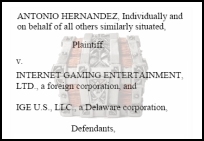 VB has obtained a joint motion (.pdf) filed July 11 in the not-yet-certified class-action case Hernandez v. IGE claiming the parties are “diligently pursuing settlement negotiations” and seeking extra time, which the court granted, to file a report so they can continue negotiations. This raises some questions.
VB has obtained a joint motion (.pdf) filed July 11 in the not-yet-certified class-action case Hernandez v. IGE claiming the parties are “diligently pursuing settlement negotiations” and seeking extra time, which the court granted, to file a report so they can continue negotiations. This raises some questions.
[Updated July 21, 2008 - The parties also sought a second extension of time (.pdf) on the same grounds, which the court also granted.]
You never really know if claims of impending settlement mean much, but this one seems likely to have something behind it both because it was jointly filed, and because the parties had plenty of time to comply with the order for which they sought an extension. [Update July 21, 2008 - And because the parties now have sought two on the same grounds.] The timing may also have something to do with the fact that IGE CEO Brock Pierce was scheduled to be deposed on July 10 and 11. It is not clear whether that deposition actually took place, and (understandably, if they are in settlement negotiations) neither side responded to VB’s request for comment.
For the full background of this case, see VB’s complete coverage. In brief, plaintiff is suing IGE on behalf of essentially all World of Warcraft players on the grounds that IGE, by farming gold, spamming chat, camping spawns, and generally diminishing the World of Warcraft experience, allegedly prevented players from receiving the full benefits Blizzard intended them to receive as third party beneficiaries of Blizzard’s Terms of Use and End User License Agreement.
The case is still pre-class certification, which means that the judge has not yet decided whether this will go forward as a class action or not. Settlement at this point would remove the risk of class certification, which would benefit IGE tremendously. It could, of course, benefit Hernandez as well, depending on what IGE is offering.
Commentary
Some readers have probably already spotted the potential problem here. Settlement at this point would almost certainly be between IGE and Hernandez only, and there is a class of millions of World of Warcraft players out there who were theoretically harmed as well — and who, Hernandez has been arguing, all deserve compensation.
Attorneys disagree on how this situation should be handled. From a paper on this subject by Richard A. Cirillo and Colleen J. O’Loughlin, entitled Ethical Challenges in Class Actions (.pdf):
Plaintiff’s attorneys contend that named plaintiffs owe a fiduciary duty to potential class members. If this is so, then any precertification settlement that benefits a named plaintiff at the expense of potential class members constitutes a breach. Plaintiff’s attorneys regard such conduct as self dealing whereby the individual settlement compromises that interest of potential class members for that of a named party.
Defense attorneys disagree. Consistent with the approach discussed earlier concerning precertification communications, defense attorneys argue that no formal relationship exists between a named plaintiff and potential class members precertification and that, accordingly, no fiduciary duty exists. Accordingly, defense attorneys believe in the freedom to engage in settlement discussions with named plaintiffs.
Courts strike a balance. Faced with individual settlement precertification, most courts recognize such an agreement provided that the settling plaintiffs receive no premium, and that no prejudice results to absent class members.
Per my usual policy, I’ll limit my comments as this is an active lawsuit, but in general terms, the way most courts look at it, any settlement that gives a bigger benefit to the named plaintiff (here, Hernandez) than is reasonably indicated by the facts would be viewed with some suspicion. On the other hand, if there’s no premium paid to the plaintiff over and above the reasonable maximum of what was sought for any one member of the class, and where the class remains free to file another lawsuit with a different lead plaintiff, then the suit can be settled.
 I very much hope that the attorneys involved are being careful here. If not, it will look like Hernandez leveraged a potential class action for personal gain beyond what was actually sued for (the value of a diminished World of Warcraft experience), or, alternatively, that IGE essentially bribed him to drop the suit before it could get really expensive — either of which seem at least as underhanded as camping spawns.
I very much hope that the attorneys involved are being careful here. If not, it will look like Hernandez leveraged a potential class action for personal gain beyond what was actually sued for (the value of a diminished World of Warcraft experience), or, alternatively, that IGE essentially bribed him to drop the suit before it could get really expensive — either of which seem at least as underhanded as camping spawns.
I also wonder, if this settles, if someone else will file another suit against IGE or another virtual property company, perhaps taking into account some of the arguments set forth by IGE in response to the motion for class certification by limiting the class size and the scope of the suit.
 Q: How many employees at Linden Lab?
Q: How many employees at Linden Lab?


 VB has obtained a
VB has obtained a  I very much hope that the attorneys involved are being careful here. If not, it will look like Hernandez leveraged a potential class action for personal gain beyond what was actually sued for (the value of a diminished World of Warcraft experience), or, alternatively, that IGE essentially bribed him to drop the suit before it could get really expensive — either of which seem at least as underhanded as camping spawns.
I very much hope that the attorneys involved are being careful here. If not, it will look like Hernandez leveraged a potential class action for personal gain beyond what was actually sued for (the value of a diminished World of Warcraft experience), or, alternatively, that IGE essentially bribed him to drop the suit before it could get really expensive — either of which seem at least as underhanded as camping spawns.